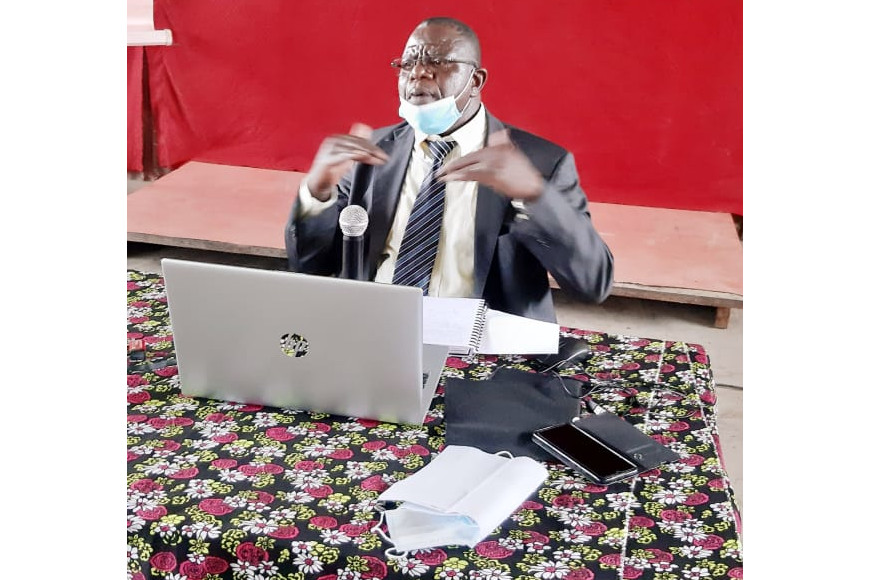The Durban University of Technology’s (DUT’s) Honorary Research Fellow at the International Centre for Nonviolence (ICON) and Member of the International Peace Research Association (IPRA’s) Council, Dr Chrysostome Kiyala, recently attended the National Peacebuilding Symposium, which was held in the Democratic Republic of Congo (DRC) in Bandundu Town.
It was co-hosted by the Institute of Ethnological Studies and DUT/ICON under the theme: Depoliticising Ethnicity and the Media for Peaceful Electoral Processes in The Democratic Republic of Congo (DRC).
He presented two papers which were titled: “Youths’ agency and peaceful mobilisation during electoral processes”, and “Peace absentees: the role of young people in peace and security efforts based on Resolution 2250 of the UN Security Council.”
Dr Kiyala has researched on the reintegration of former child soldiers into their communities in the DRC; the findings of which have been reported in several articles, book chapters and a major book with the following title: Child soldiers and restorative justice: Participatory action research in the eastern DRC. His current research interests include increasing the effectiveness of civil society organisations in building sustainable peace in Sub-Saharan Africa, Peace ecology and reducing violence on South African university campuses and colleges.
As a representative of DUT, he specified that his main aims in co-hosting the symposium with the Institute of Ethnological studies of Bandundu were threefold: (1) To extend ICON’s spirit of partnership with research and university institutions in African regions; (2) To share DUT/ICON’s expertise on nonviolence and peacebuilding with the DRC’s educational institutions and civil society; and (3) To gain insights on local strategies (jurisprudence and culture) to combat violence that is chronic and endemic in many countries.
Voicing the role that ICON plays at regional and international academic arena, Dr Kiyala commended DUT/ICON’s dedication over the past years to initiate and support academic peacebuilding programmes via training workshops, papers delivered at conferences and symposia, developing degree and non-degree purpose training at both graduate and postgraduate levels, conducting research and publishing outstanding outputs in the areas of peace studies and conflict transformation.
“Since 2013, I have been part of ongoing efforts to promote peace in the African continent from ICON. I see peace studies as an unavoidable field of studies that should be embraced by all academic streams, by various fields of arts and technology, starting from primary education to university campuses and other higher learning institutions to reduce violence that is so entrenched in our communities,” he said.
Furthermore, he explained that, “At ICON, we have identified peace studies and nonviolence as important areas of research we hope to promote and expand farther in the Continent. For instance, in our discussions, ICON’s Professor Geoff Harris noted that the Peacebuilding Programme at DUT is the largest postgraduate programme in peace studies on the African continent, and to date more than 70 PhD and 25 Master’s students have registered in this stream, all of whom have written theses based on action research and published their outputs in highly respected peer-reviewed journals and publishing houses,” he added.
Presently, as a DUT’ representative, Dr Kiyala assists with coordinating the nascent Consortium of University which offer students the opportunity to pursue graduate and postgraduate studies in peacebuilding in the Great Lakes Region. These institutions include: The Evangelical University of Africa, the Catholic University of Goma – La Sapientia, the Catholic University of Bukavu, the Sub-Saharan University of Africa in the DRC; the Great Lakes School of Theology and Leadership in Burundi.
Dr Kiyala further relayed that making peace education an imperative in all educational environments is a cost-effective tool that can help to minimise and prevent the amplitude of inhumanities we experienced on educational spaces and our society at large. “This is the reason why I decided to take ICON’s vision and agenda to the symposium to Congo, a country with that has been confronted with multifaceted human rights’ violations and human atrocities,” he said.
He stressed that the symposium was unique in its innovativeness and manifoldness—embracing various themes of peacebuilding beyond those directly related to electoral violence fuelled by insensitive media reporting and ethnicity. That is the greatest lesson he learned from the symposium.
Finally, Dr Kiyala mentioned that his next presentation would take place in Nairobi in June 2021 where, with DUT’s Prof Geoff Harris, they will be helping universities in Eastern Africa to develop postgraduate programmes in peace studies as they had done two years ago in the Great Lakes Region at the Catholic University of Goma-La Sapientia in Goma, eastern DRC.
Pictured: Dr Chrysostome Kiyala
Waheeda Peters


